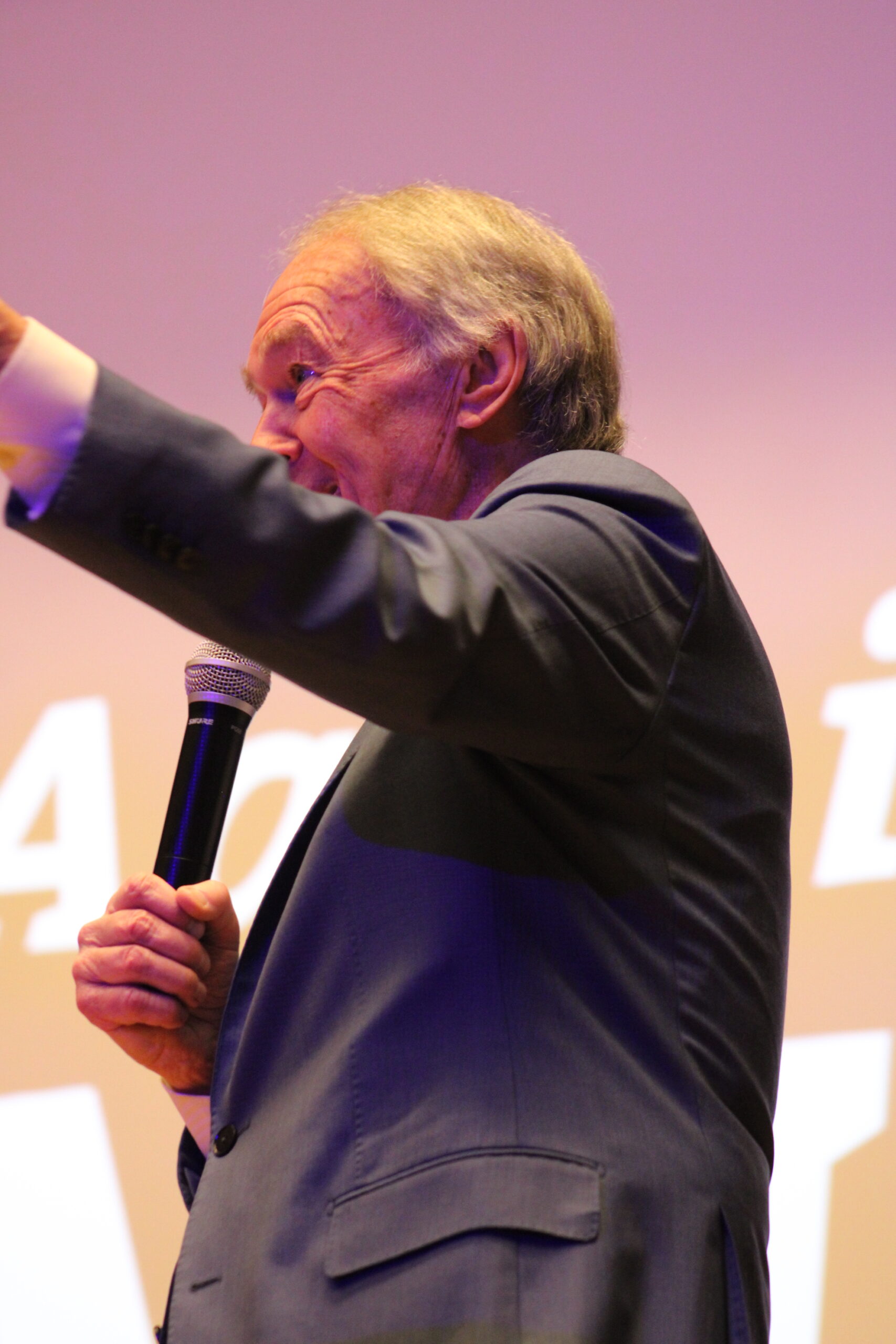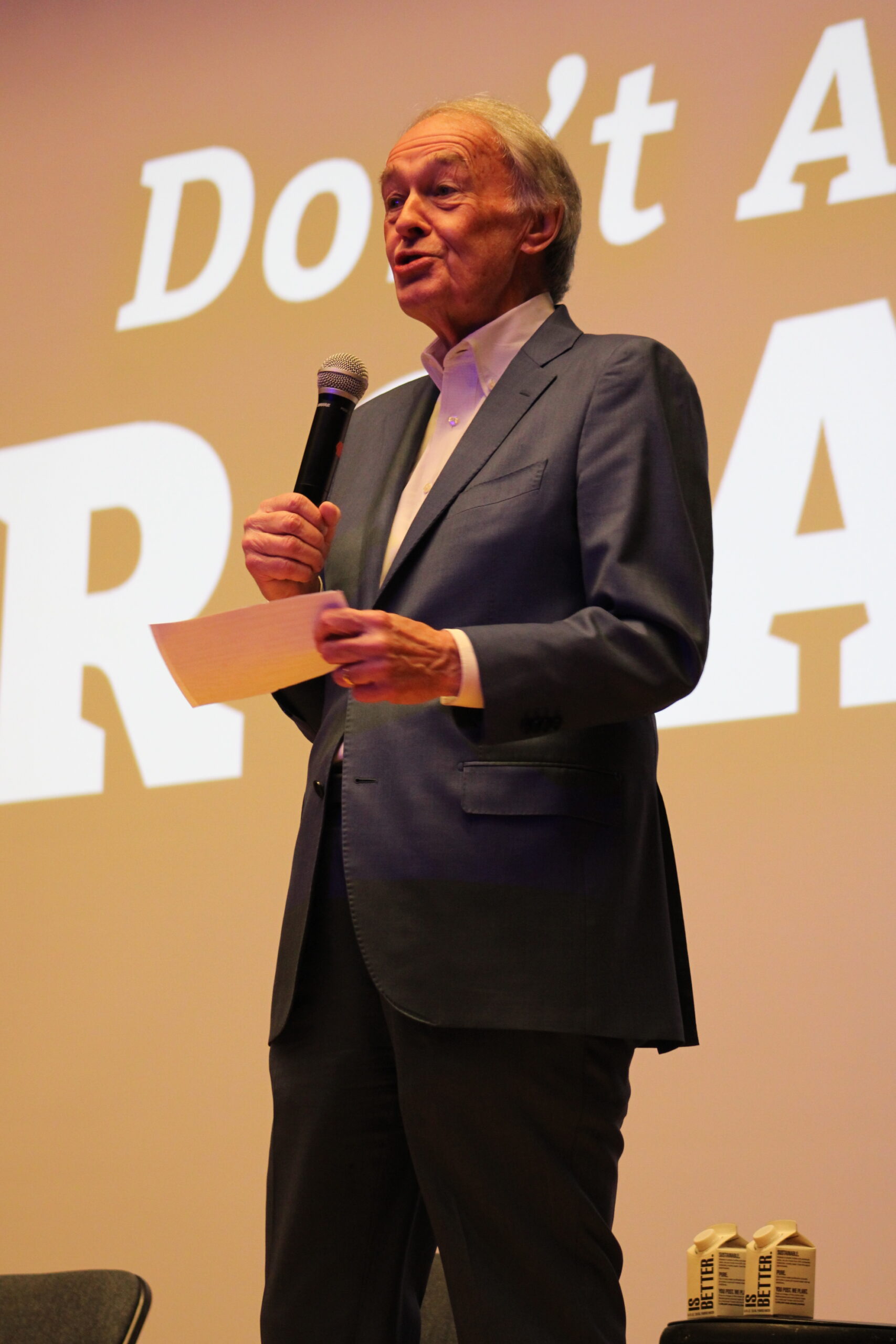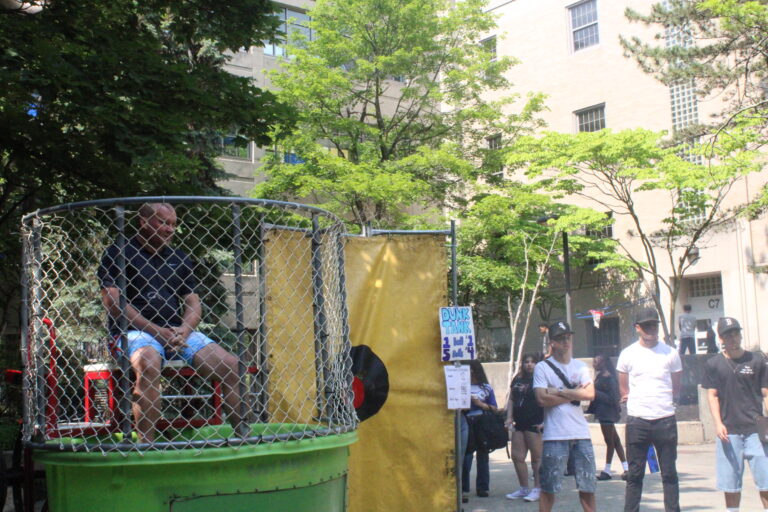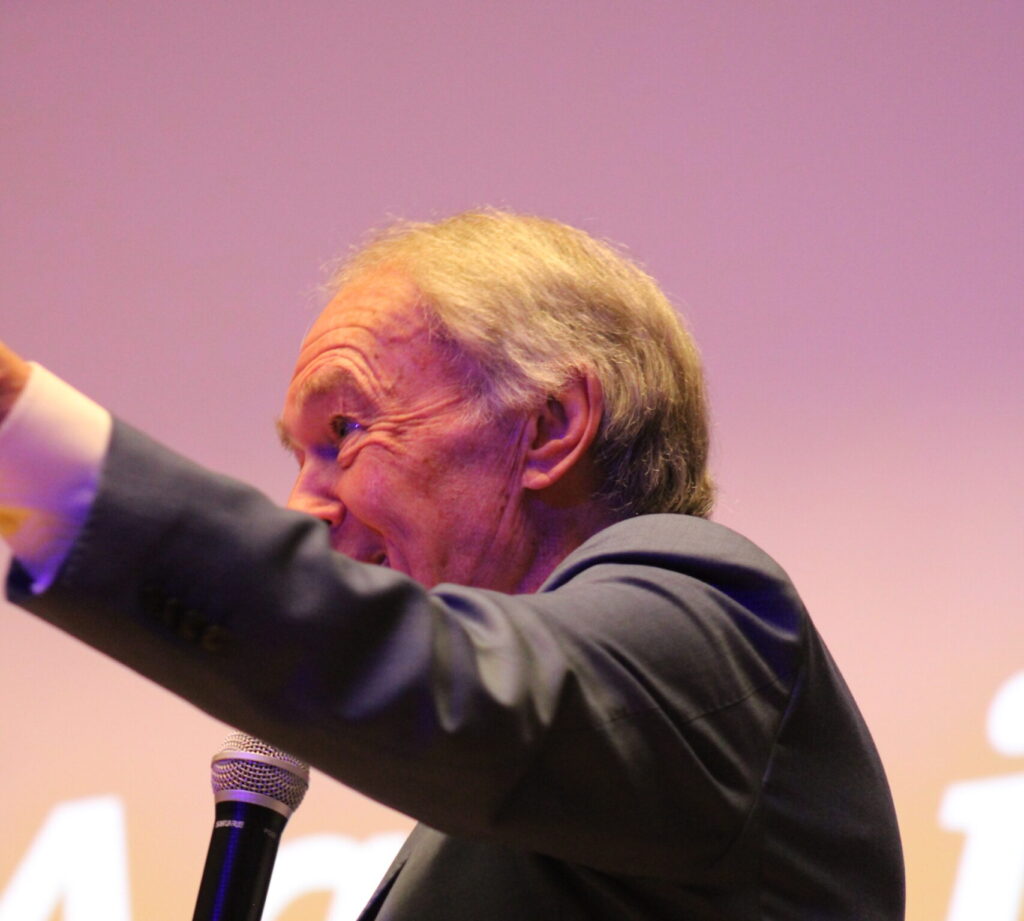
In an auditorium brimming with anticipation, Senator Ed Markey stood before a crowd ready to challenge the status quo, delivering a passionate call to action as he outlined his vision for a future that resists the growing influence of President Donald Trump and Elon Musk. On March 8th, by the time doors opened at 1 p.m., the line was already snaking down the Jenkins steps, wrapping around to the corner of Salem and Main Street; by 2 p.m., the venue was at capacity and the overflow roo ms of the cafeteria were filled as well.
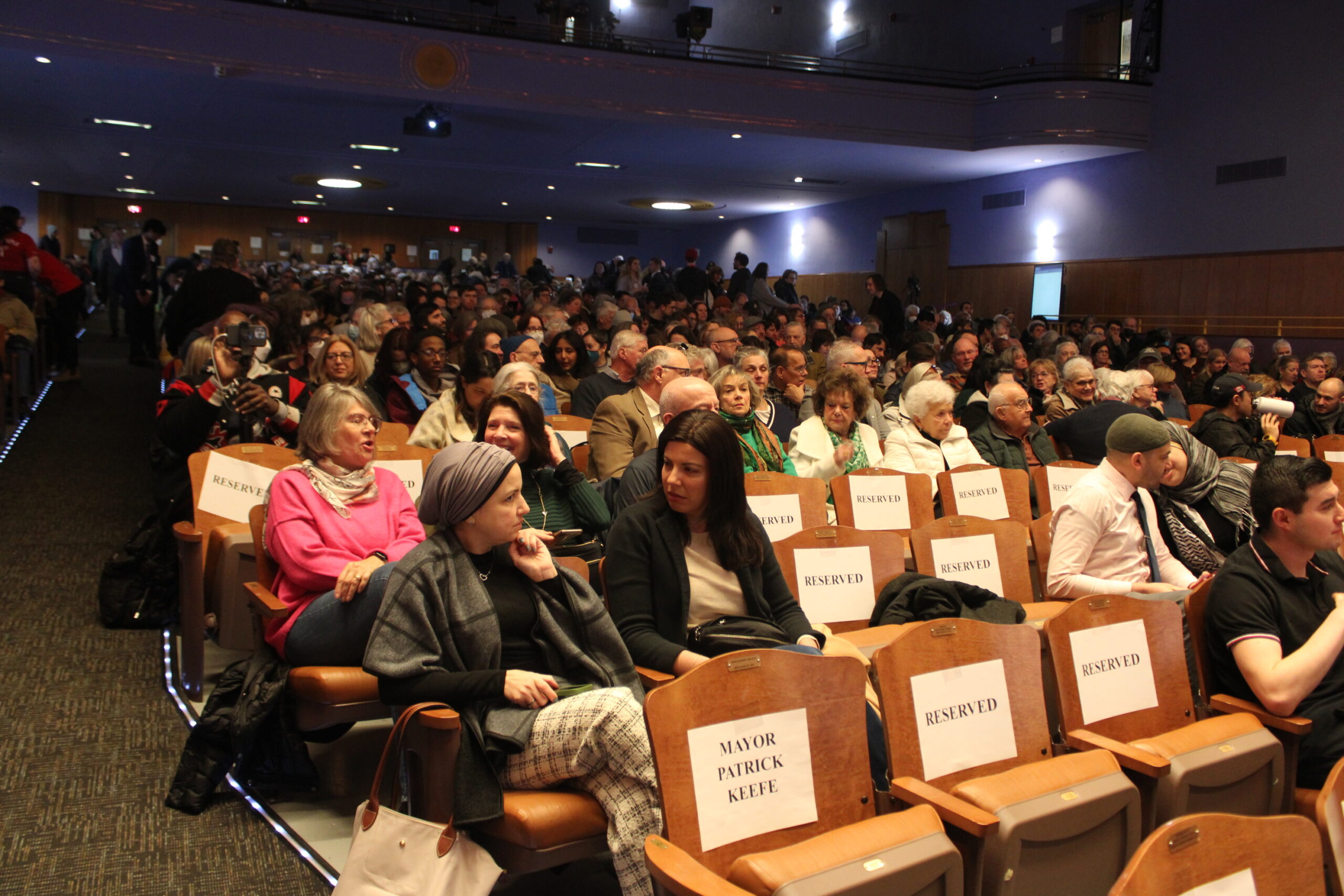
Outside and across the street, protesters gathered across the street, waving banners and flags emblazoned with slogans like “Deport Illegals”, “Maura Healey Has 2 Go”, and “Back the Blue”. Their chants—such as “This is not Venezuela, this is MAGAchusetts”—echoed through the street, an unmistakable backdrop to the event inside. While security enforced a strict no-signs-or-banners rule within the auditorium, nothing prevented demonstrators from making their voices heard in the public space beyond the school’s doors.
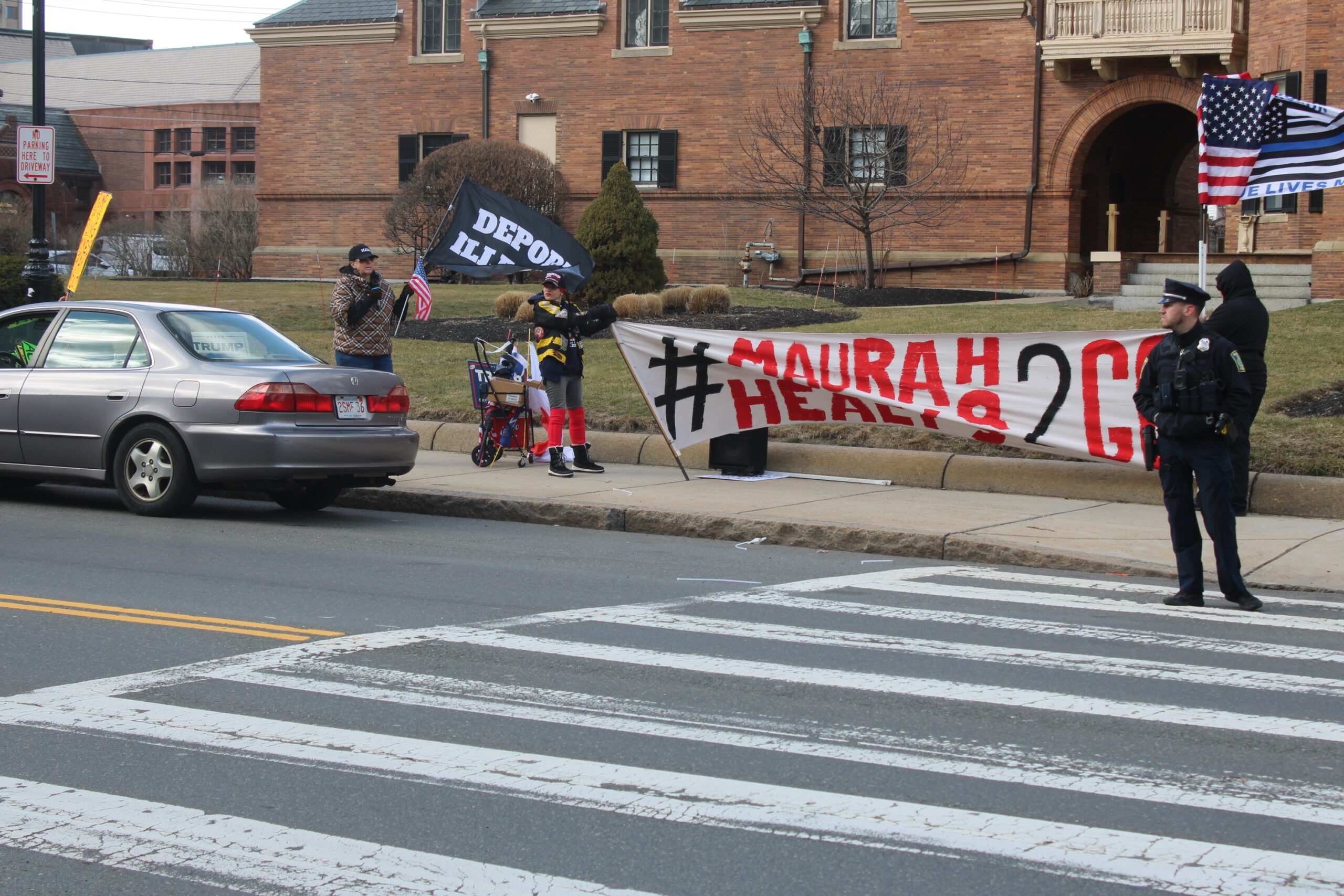
Protestors across the street from Malden High, holding flags and banners saying “Deport Illegals”, “Maura Healey Has 2 Go”, and “Blue Lives Matter”. MACK KEATING
Inside, Malden High School senior Natalie Keating took the stage, starting the event off with a stirring rendition of the national anthem. As the crowd stood to pay their respects, State Senator, U.S. Army, National Guard, Judge Advocate General, and Lieutenant Lydia Edwards took the stage for an introduction to the event.
Edwards began with an impassioned speech calling for increased efforts to defend democracy and protect marginalized communities. She decried the influence of wealthy political elites and the rising tide of division in US politics. “We cannot be divided by people who are willing to sacrifice anyone for profit, power, and influence. Unless you value, include, celebrate, and treat with dignity transgender Americans, gay Americans, lesbian Americans, Black Americans, women, immigrants, Latinos, and Asians, you are not living up to the dream—our American dream,” Edwards asserted.
She continued, emphasizing the dire need for a shift in the national political landscape: “You cannot go out there and talk about how you support democracy unless you can look at every marginalized community and say, ‘We are going to do something about it.’ And that includes the LGBTQIA+ community, it includes working-class communities, it includes communities of color, it includes immigrants.”
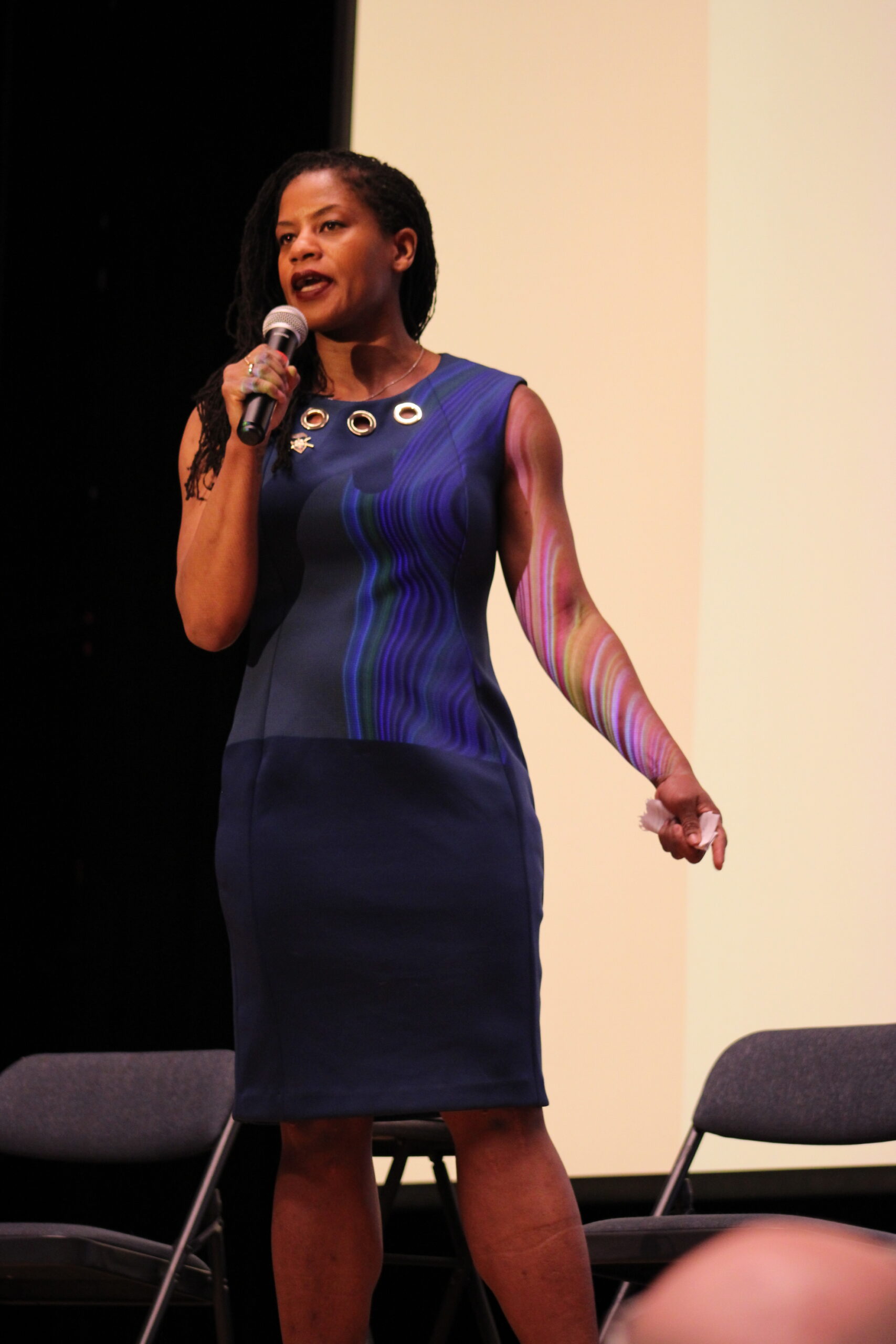
She acknowledged the complexities of the current political climate, calling for everyone to stand in defense of democratic values. “We’re in a fight for the future of democracy. The division is clear, and the challenge is immense,” she explained, adding that fighting for the most vulnerable populations in America must remain a priority. “We must focus on inclusivity, ensuring that people are not left behind in the pursuit of a more just and equitable society.”
Edwards concluded by thanking Markey for the opportunity to take the stage with him before passing off the microphone. Markey, in turn, wasted no time addressing the pressing concerns at the heart of the town hall. Standing before the packed crowd, he outlined what he called the “high-stakes battle for our future,” warning that President Trump and his allies were poised to slash vital programs, threatening the security of millions.
“Everything that is happening in Washington right now—if Donald Trump, Elon Musk, and all of their allies have their way—will have a profound impact on Malden,” he warned. He utilized key statistics of at-risk programs, such as the 2 million Massachusetts residents who rely on Medicaid—including 330,000 individuals with disabilities—as well as students who depend on federal education funding. Trump’s proposed budget cuts, he warned, would “gut” these essential services.
Markey made his message personal, recounting how his mother had been forced to give up her education to care for her siblings in the days before Social Security and Medicaid existed: “That is the fundamental unfairness we fought to correct in this country, and now, Trump wants to take us backward.”
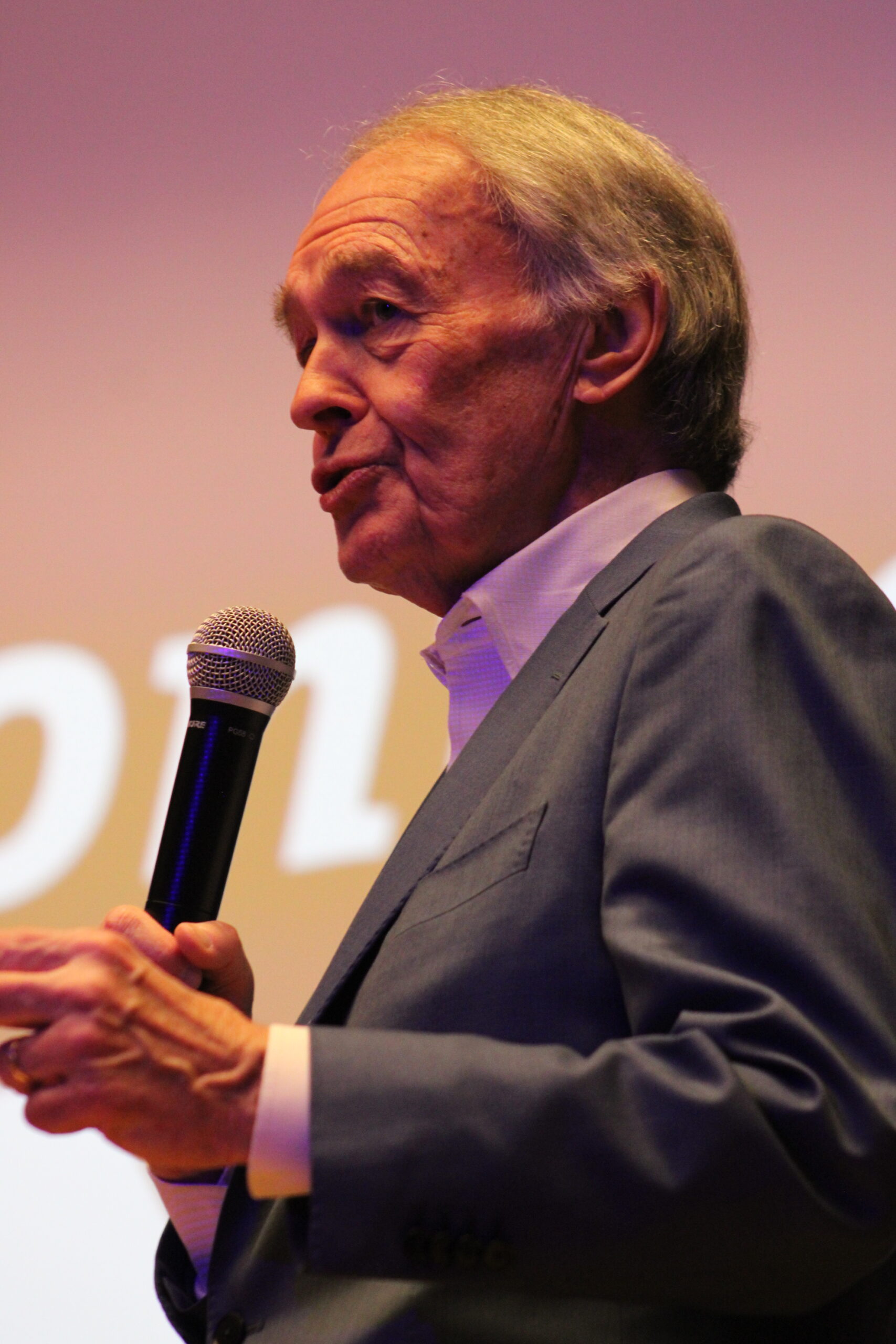
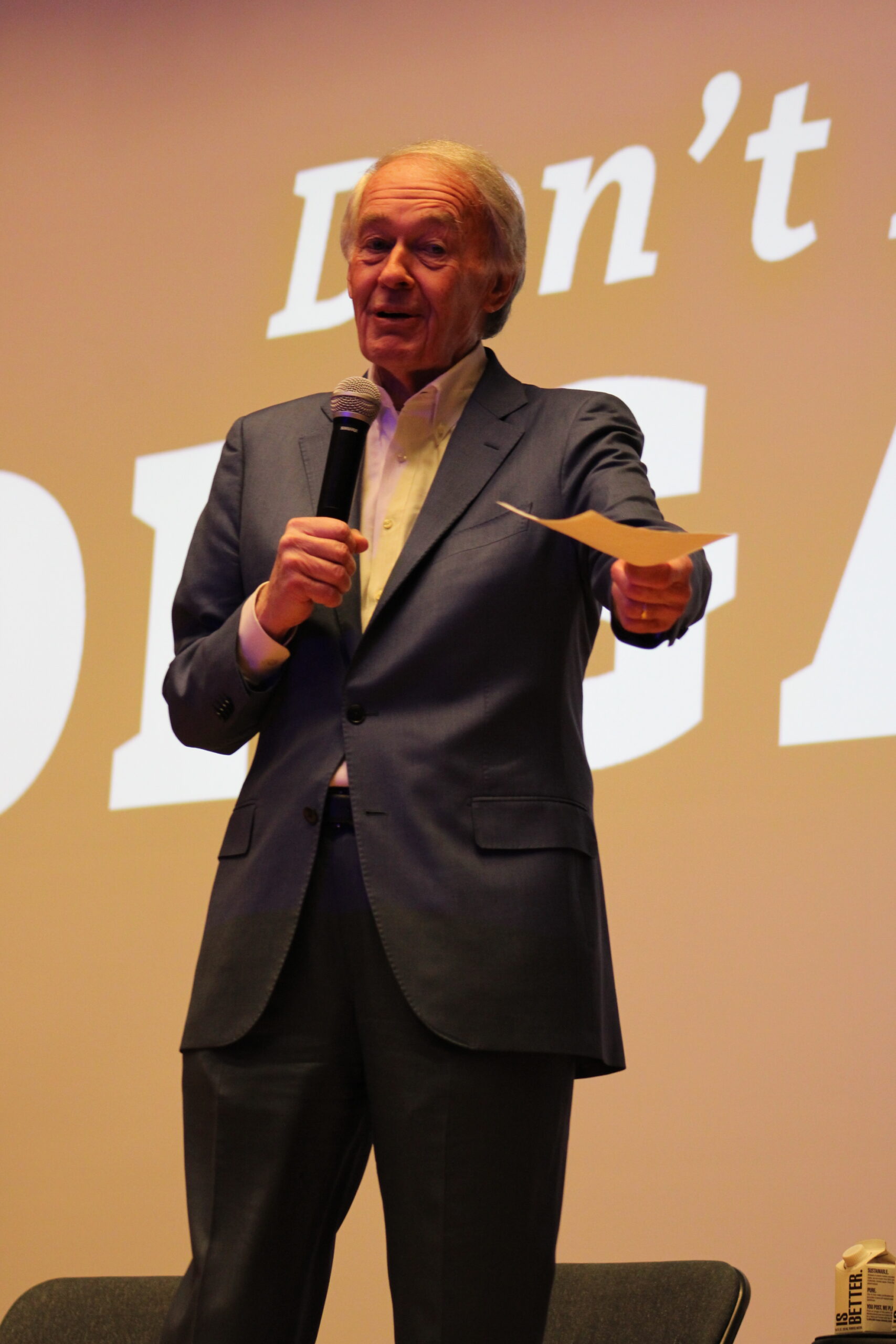
With Malden’s diverse student body heavily reliant on Title I funding, Markey stressed how critical educational resources are in ensuring academic success. “Thanks to these investments in education, we have the highest percentage of students going to college in the city’s history,” he proclaimed, emphasizing the need to protect it.
Finally, he addressed the issue of clean energy. Reflecting on the days when the Malden River was so polluted that it was little more than a toxic wasteland from businesses dumping oil and trash, Markey pointed to the progress that has been made. He warned, however, that these advances are now at risk: “The funding that has helped clean up these sites across the country is on the chopping block, sacrificed for tax cuts to the rich.”
To address these three issues, Markey introduced his three guest speakers: Michael Curry, President and CEO of the Massachusetts League of Community Health Centers; Jessica Tang, President of the American Federation of Teachers Massachusetts; and Casey Bowers, Vice President of Government Affairs for the Environmental League of Massachusetts.
Curry, who grew up in Roxbury, believes his upbringing informs his work today. “I have the privilege of representing 50 health centers across Massachusetts… we serve over a million patients from diverse backgrounds—Republican, Democrat, white, Black, brown—speaking over 40 languages. Our health centers are a lifeline.”
Quoting Martin Luther King Jr., Curry explained that health centers have served as essential resources in historically underserved communities: “‘Of all the forms of inequality, injustice in healthcare is the most shocking and inhumane.’ This movement was born from that call.”
This movement, he emphasized, impacts everyone. “If we don’t ensure people have access to healthcare early, they end up in the emergency room, where conditions are worse and more expensive to treat,” he warned. “We need to pay now or pay greater later.”
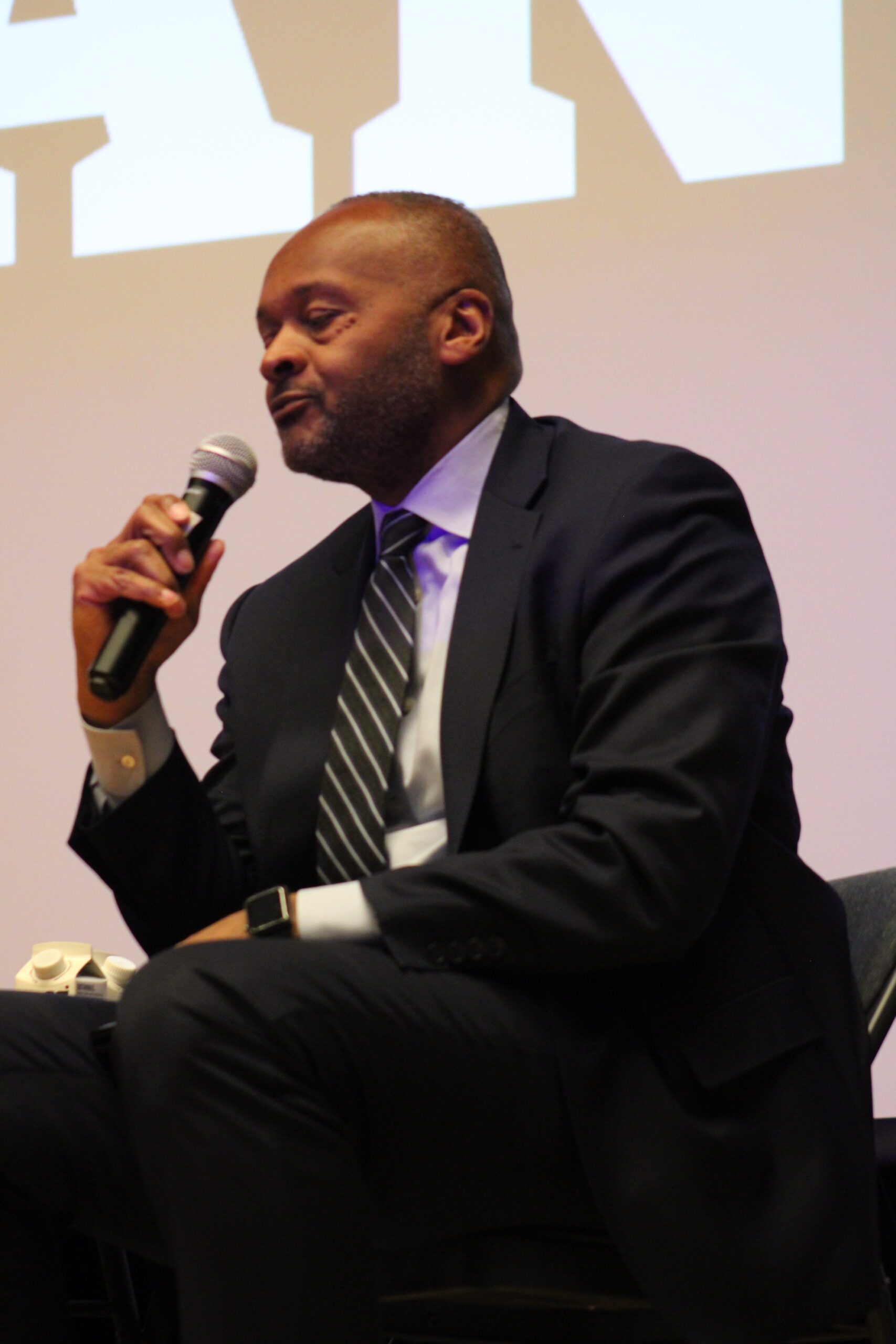
“Without insurance, people are forced to choose between life-saving care and basic survival. It’s a crisis.”
Michael Curry
Curry ended his address with a stark warning: “Medicaid is under threat. If these cuts happen, millions will lose access to care, and it will be a crisis not just for the uninsured, but for all of us,” he concluded.
Access to medical care is not the only resource threatened by the current administration: following Curry’s remarks, Tang spoke about the growing threat to education. “We’ve seen an increase in class sizes, a decrease in funding, and an overall lack of resources,” she noted, beginning her address.
“The proposed cuts to the Department of Education would have disastrous consequences,” she explained. “Programs like Title I, which support low-income students, are on the chopping block… if these cuts go through, these critical programs could be wiped out.”
It is cities like Malden that will see these effects first, as they would disproportionately affect marginalized communities. “Our schools already struggle with limited resources,” Tang explained. “These cuts will hurt students from low-income families and communities of color the most. We cannot let this happen.”
“In Malden, essential programs are at risk, including $2 million in Early Childhood Special Education IDEA funds, $238,000 for supporting effective instruction, $278,000 for English language acquisition programs, and $161,000 for academic enrichment—totaling nearly $5 million in lost funding. This is a huge portion of the budget, especially when school districts are already struggling to maintain existing jobs and services.”
These threats are not just bureaucratic; they have real consequences for all our communities, Tang explained. “Without equitable access to education, we risk losing generations of students who won’t have the support they need.” This impact goes beyond academics; it affects services such as before- and after-school programs, social-emotional support, and physical health.
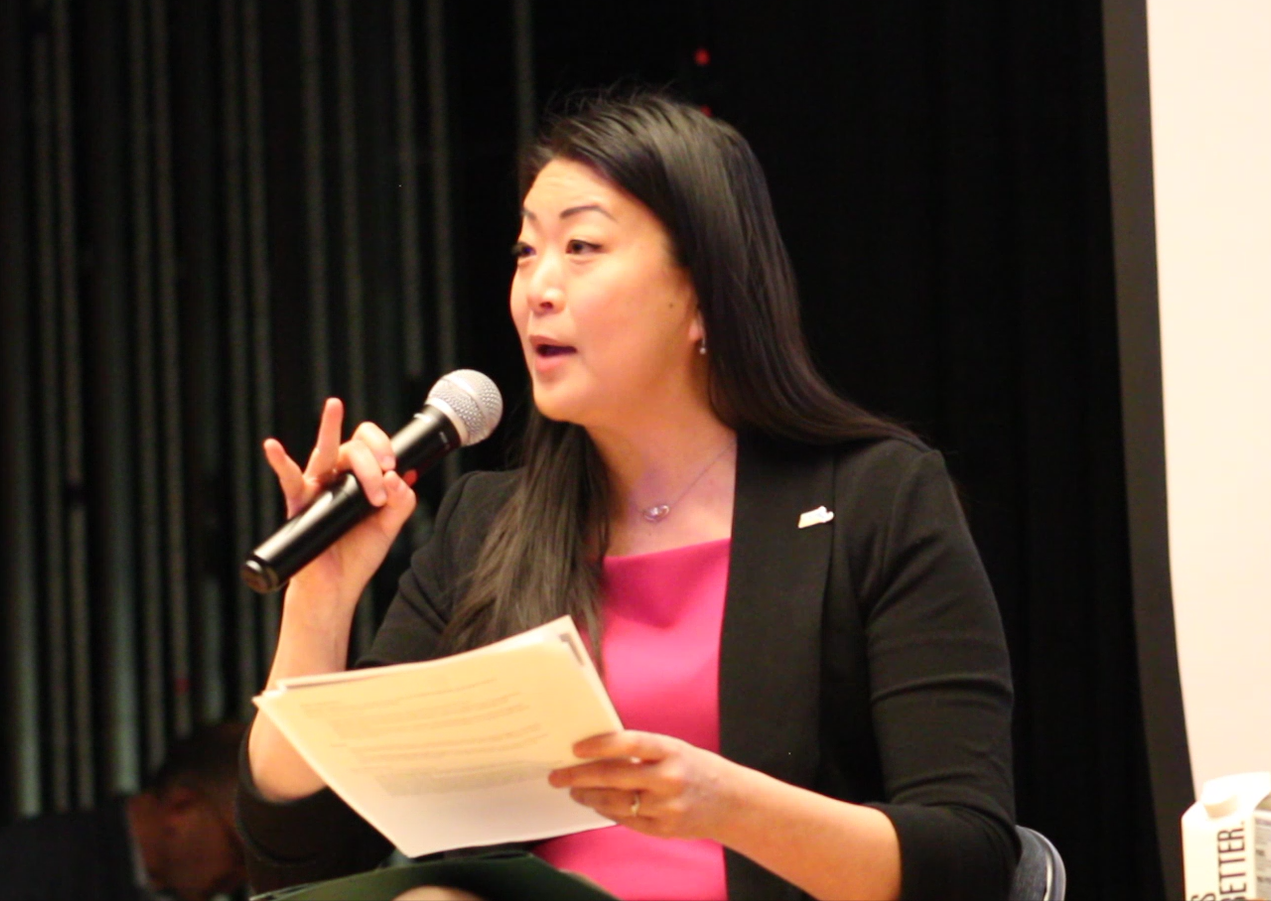
Connecting back to Curry, Tang emphasized that many essential services, like school nurses, occupational and physical therapists, and medical transportation for special education and disabled students, rely on Medicaid funding. “These cuts are not happening in isolation,” she explained. “When you add them all up, the impact on our communities and our democracy is undeniable.”
Ultimately, Tang argued, “This is about protecting the future of education and ensuring that every child has access to the opportunities they deserve.”
Passing the microphone off, Bowers echoed her colleagues’ concerns but under the scope of clean energy resources. Bowers emphasized that this is a critical moment in the fight against climate change, calling for immediate, impactful policies to match the severity of the crisis. She made it clear that the urgency of the situation is exacerbated by recent setbacks in environmental policy. “We are seeing freezes to the Inflation Reduction Action, the decimation of Justice40 initiatives, and cuts to environmental justice programs that were designed to address decades of harm inflicted on marginalized communities,” she noted.
Referencing specific communities like Springfield, Massachusetts, where residents are grappling with the severe health effects of pollution and systemic environmental injustice, she emphasized that we are already seeing negative impacts in Massachusetts despite efforts.
To mitigate these changes, Bowers looked to efforts such as offshore wind, which provide renewable energy sources, create jobs, and increase energy independence. “Right now, we are over-dependent on external energy sources,” she explained, urging the audience to invest in these changes.
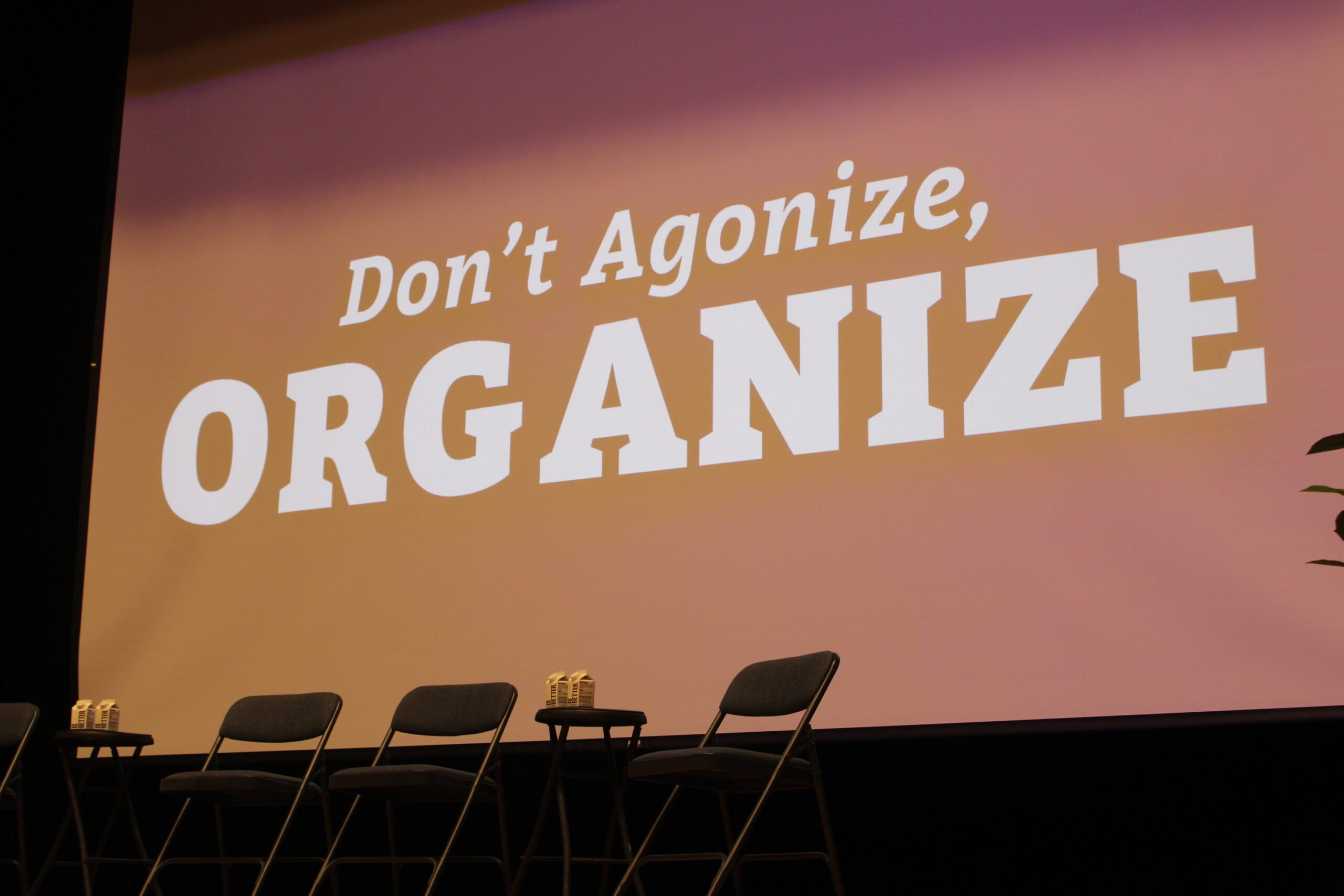
She also acknowledged the critical role of federal environmental protections, particularly the EPA’s endangerment finding, which allows the agency to regulate harmful emissions. Bowers reminded the audience of Massachusetts’ crucial role in bringing about this regulation, citing the 2007 lawsuit against the EPA that ultimately led to the establishment of emission standards.
Bowers concluded on an optimistic note, calling on everyone to continue their efforts: “We have been at the forefront of climate action before, and we will be at the forefront again,” she encouraged. “This is a difficult fight, but looking at the energy and dedication in this room, I believe we can move forward and continue our progress on climate initiatives.”
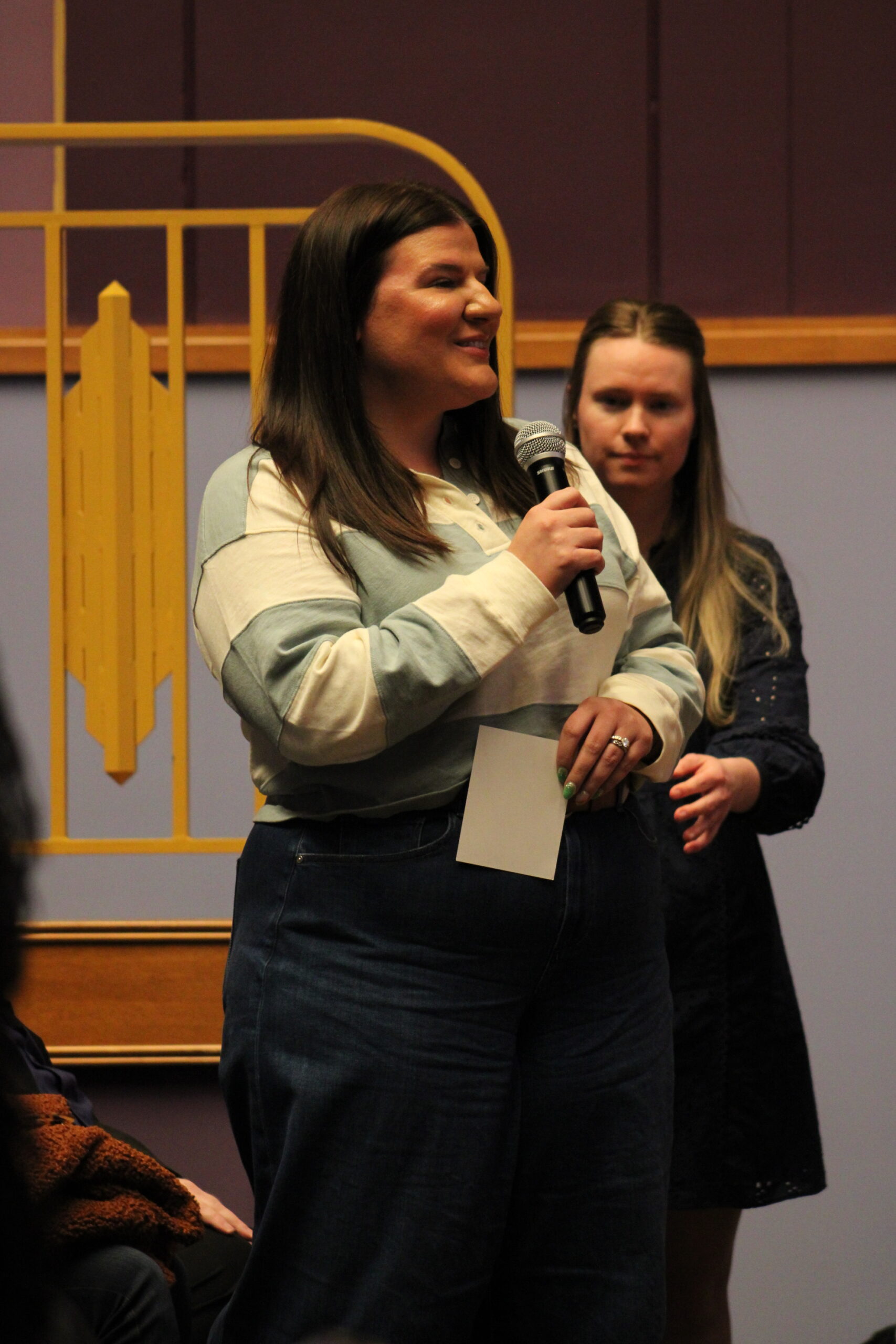
AP US Government and Politics teacher Erika Tonachel asks Ed Markey about the state of checks and balances under the current administration. MACK KEATING
Following the main speakers at the event, a Q&A session allowed audience members to voice their concerns and seek clarification on pressing issues. The first question came from AP US Government and Politics teacher Erika Tonachel, who asked on behalf of her students, “Does the system of checks and balances still function in the US government?” Markey emphasized the historical importance of checks and balances as enshrined in the Constitution, stating, “Checks and balances remain a crucial pillar of our democracy, ensuring that no branch exceeds its authority.” He particularly highlighted Congress’s power of the purse, expressing concerns over attempts of the executive branch to unilaterally redirect funds. Markey cited examples of the judiciary stepping in to block such efforts and reaffirmed that “litigation, legislative action, and public activism are all necessary to uphold democratic principles.”
The next question came from a retired research scientist who shared concerns about attacks on science and medical research, as well as the financial stability of programs supporting individuals with disabilities. As a 70-year-old mother of two disabled adult sons, she asked, “My family relies on Social Security, SSDI, Medicare, and MassHealth. How do Democrats plan to protect these vital programs from being slashed?”
Markey responded by ensuring the protection of these programs: “I and my colleagues are committed to safeguarding these programs against any efforts to weaken them.” Taking the microphone after a brief reintroduction, Curry reiterated the importance of Medicaid and Medicare for families across the country, emphasizing, “Disabilities and illness do not discriminate based on political affiliation,” urging the audience and legislators to continue to reach out to Republican lawmakers to prevent cuts to these critical programs.
The conversation redirected to a mother from Winchester, who asked, “What can we do when we are so aligned with so many of our elected officials? How can we actively support and advocate for these policies?”
Markey’s answer was clear: Use your voice. “You have friends across the country, especially in states where support for these programs might not be as strong. Use your connections and use your voices. Social media is a powerful tool,” he urged. “We can’t just sit back and hope things will improve. We need to be proactive, organizing, and spreading the message of why these services are crucial for the wellbeing of families everywhere.”
The next question came from Mary Beling, who expressed her horror at how the Ukrainian president, Volodymyr Zelensky, was treated at the Oval Office just days prior, asking, “Is there anything that can be done to support Ukraine and Palestine?”
Before Markey responded, however, a round of applause and cheering broke out from the crowd. Within seconds, a majority of the crowd was on its feet, clapping loudly and shouting their support for the people endangered in these countries. After several moments, the crowd eventually died down, and Markey was able to answer.
“Putin is a dictator. Zelensky is not. Russia invaded Ukraine; Ukraine did not invade Russia,” Markey clarified, condemning the actions of those who had insulted Zelensky and undermined Ukraine’s efforts to defend its sovereignty. “To insult Zelensky, to insult Ukraine—a democracy fighting hard for their people—is so fundamentally contrary to who we are as a people.”
“What Trump and Musk are doing is absolutely irresponsible,” he pushed, pointing to how their actions could embolden harmful ideologies and undermine global support for Ukraine. “When Musk gives that salute, when Steve Bannon gives that salute, it’s a permission slip for people in our country to act, to say, to do things that we have worked for generations to root out of our society.”
The final question came from Darl, a Melrose citizen, a dedicated advocate for clean energy, and the founder of a small business in zero-emission transportation. He expressed frustration over frozen contracts for clean energy projects, with millions of dollars at stake, and asked whether this funding was congressionally approved.
Markey responded by acknowledging the critical importance of supporting clean energy businesses and outlined the broader context of the struggle, highlighting the success of the Inflation Reduction Act, which, despite opposition, had passed significant climate-focused policies and created tax breaks for clean energy projects.
He then transitioned to shed light on the political challenges hindering the advancement of clean energy, as the Republican-controlled branches of Congress are more focused on the fossil fuel industry. Markey emphasized the urgent need for vigilance to protect the future of clean energy initiatives and projects.
After over two hours, the event came to a close. Senator Markey’s conversation with his constituents underscored the importance of continued advocacy and determination in the fight for climate action. From supporting Ukraine in its battle for sovereignty to protecting the integrity of clean energy projects, Markey made clear his commitment to standing up against powerful forces that seek to undermine democracy and the future of the planet. His responses were both a call to action and a reminder of the work still left to be done to ensure a sustainable and just future .

